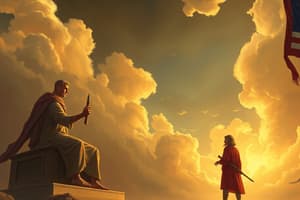Podcast
Questions and Answers
When was the Civil Constitution of the Clergy founded?
When was the Civil Constitution of the Clergy founded?
1790
Why was the Civil Constitution of the Clergy founded?
Why was the Civil Constitution of the Clergy founded?
To require bishops and clergy to swear an oath of loyalty to the state.
What was the outcome for clergy who did not take the oath?
What was the outcome for clergy who did not take the oath?
They were deprived of their offices and salaries.
What was a significant aftermath of the Civil Constitution Oath?
What was a significant aftermath of the Civil Constitution Oath?
How did the Civil Constitution of the Clergy affect national unity?
How did the Civil Constitution of the Clergy affect national unity?
What did historian J.F. Bosher say about the Civil Constitution?
What did historian J.F. Bosher say about the Civil Constitution?
What major event did Louis XVI attempt on June 20th?
What major event did Louis XVI attempt on June 20th?
What was the impact of Louis's Flight to Varennes on his reputation?
What was the impact of Louis's Flight to Varennes on his reputation?
What were the consequences following Louis's Flight to Varennes?
What were the consequences following Louis's Flight to Varennes?
What laws did Louis veto in November 1791?
What laws did Louis veto in November 1791?
What was the significance of the Brunswick Manifesto on August 1, 1792?
What was the significance of the Brunswick Manifesto on August 1, 1792?
Flashcards are hidden until you start studying
Study Notes
Civil Constitution of the Clergy
- Established by the National Constituent Assembly in 1790 to reform the Catholic Church in France.
- Required bishops and clergy to swear loyalty to the state, diminishing papal authority and influence.
- Only seven out of 160 bishops took the oath, leading to significant non-compliance among clergy.
- The Pope suspended those who took the oath, branding them as counter-revolutionaries by November 1791.
Reasons for the Oath
- Aimed to address the issues of corruption within the Church linked to the government’s financial crisis and the abuse of the tithes system.
- Intended to align the Church's operations with revolutionary ideals and national values.
Aftermath and Consequences
- Generated dissent and intensified opposition to the revolutionary government, as large numbers of clergy fled.
- More than half the population feared changes to their faith, viewing the Assembly's actions as punitive.
- Contributed to a loss of national unity, which played a role in the counter-revolution and civil war.
Historian Perspective
- Historian J.F. Bosher identified the Civil Constitution as a key measure responsible for deepening national divisions.
Impact of Louis XVI's Actions
- The King’s attempted escape (Flight to Varennes) on June 20, 1791, severely damaged his image and highlighted his disdain for the revolutionary changes.
- His actions were perceived as treachery, revealing his true intentions, and causing the public to feel betrayed.
- Following the flight, temporary suspension occurred on July 16, 1791, deepening political divisions and calls for the monarchy's downfall.
Louis XVI's Vetoes
- In November 1791, Louis vetoed two critical laws aimed at addressing émigrés, increasing suspicions that he opposed revolutionary reforms.
- This act contributed to growing unrest and fear that he was actively undermining the revolution.
External Threats
- The Brunswick Manifesto on August 1, 1792, made Parisians responsible for any harm to the King, further escalating public tension.
- Louis’s actions were increasingly perceived as conspiratorial, exacerbating fears of a counter-revolution against the republican ideals.
Studying That Suits You
Use AI to generate personalized quizzes and flashcards to suit your learning preferences.



